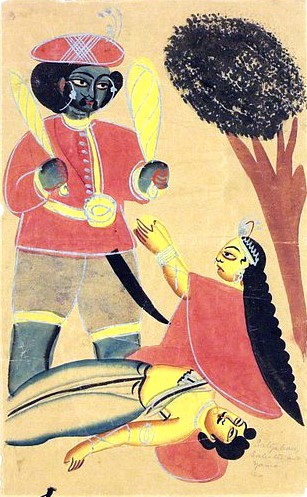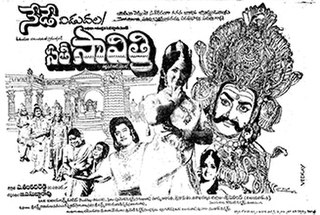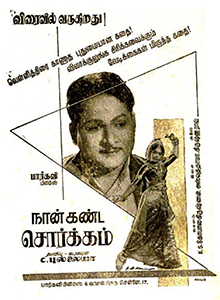
Vat Purnima is a Hindu celebration observed by married women in North India and in the Western Indian states of Maharashtra, Goa, Gujarat. On this Purnima during the three days of the month of Jyeshtha in the Hindu calendar, a married woman marks her love for her husband by tying a ceremonial thread around a banyan tree. The celebration is based on the legend of Savitri and Satyavan as narrated in the epic Mahabharata.
Savitri or Savithri may refer to:
Savitri: A Legend and a Symbol is the poetic main work of Sri Aurobindo, composed in nearly 24000 lines in blank verse. It is based on the legend of Savitri and Satyavan in the Mahabharata, which was given a symbolic significance by Sri Aurobindo. In his epic poem he deals with numerous subjects and describes especially the spiritual paths of Savitri and her father Aswapati, striving to reach a higher stage of evolution.

Savitri and Satyavan are a legendary couple in Hinduism. Savitri is a princess who marries an exiled prince named Satyavan, who is prophesied to die early. She saves her husband from the god of death, Yama, persuading the deity to restore his life.
Vemuri Gaggayya (1895–1955) was an Indian actor and singer known for his works in Telugu cinema, and Telugu theatre.

Yamagola is a 1977 Indian Telugu-language fantasy comedy film directed by T. Rama Rao who co-wrote the film with D. V. Narasa Raju. It stars N. T. Rama Rao and Jaya Prada, with music composed by Chakravarthy. The film was produced by S. Venkataratnam who also worked as the cinematographer.

Chittajallu Pullayya was an Indian film director and screenwriter. He is one of the earliest film personalities in Telugu cinema being associated with the industry right from the silent era.

Kalyanam Raghuramaiah (1901–1975), popularly known as Eelapata Raghuramaiah, was an Indian actor, and thespian known for his works in Telugu cinema, and Telugu theatre. A recipient of the Sangeet Natak Akademi Award, and the Padmashri, He was known for the roles of Krishna or Dushyantha, Bhavanisankar, Narada etc. He performed those roles for about 60 years. He indulged in elaborate raga alapana, based on different ragas while rendering padyams.
The East India Film Company was an Indian film production company, based in Calcutta, Bengal Presidency, British India. It was the first Indian film company to screen a movie at an international film festival. Started in 1932 in Calcutta, by R. L. Khemka, it went on to be a pioneer in producing films across the several regional film industries, including Bengali, Hindi, Urdu, Telugu, and Tamil, in the decade after its founding; till then, production companies were restricted regionally.

Savitri Vrata or Savitri Amavasya is a fasting day, commemorating the pious act of Savitri who rescued her husband, Satyavan, from the god of death (Yama). It occurs on the new moon day in month of Jyeshtha. Married Hindu women observe a fast to promote a long, healthy life for their husbands. It is celebrated in the Indian states of Odisha, Bihar, Uttar Pradesh and in Nepal.

Yamudiki Mogudu is a 2012 Indian Telugu-language fantasy comedy film directed by E. Satti Babu, produced by Chanti Addala under Friendly Movies banner and starring Allari Naresh and Richa Panai in lead roles. The film also features Ramya Krishna and Naresh in pivotal roles. The soundtrack for the film was composed by music director Koti, and the cinematography was handled by Ravindra Babu. The film was theatrically released on 27 December 2012.

Sati Savitri is a 1978 Telugu-language Hindu mythological film directed by B. A. Subba Rao. It stars N. T. Rama Rao, Krishnam Raju, Vanisri and music composed by Ghantasala & Pendyala Nageswara Rao. It is produced by A. Sankar Reddy under the Lalitha Siva Jyothi Studios. The film is based on the story of Savitri and Satyavan.

Savitri is a 1937 Indian Hindi-language mythological film directed by Franz Osten. Adapted from a story in the Mahabharata by Niranjan Pal with dialogues by J. S. Casshyap. The cinematographer was Joseph Wirsching. Saraswati Devi composed the music. According to Garga, Savitri was the "only mythological" produced by Himanshu Rai for Bombay Talkies, who were known for making "rurlist reform dramas". Ashok Kumar and Devika Rani played the lead roles supported by Maya Devi, Saroj Borkar, Mumtaz Ali, and Sunita Devi.

Sati Savitri is 1957 Indian Telugu-language Hindu mythological film, based on the life of Savitri and Satyavan directed by K. B. Nagabhushanam. It stars Akkineni Nageswara Rao, S. Varalakshmi, S. V. Ranga Rao with music composed by S. V. Venkatraman. It is produced by S. Varalakshmi under the Varalakshmi Pictures banner. The film was dubbed into Tamil language with the title Sathiyavan Savithri.

Naan Kanda Sorgam is a 1960 Indian Tamil-language fantasy comedy film directed and produced by C. Pullayya. The film stars K. A. Thangavelu and Sowcar Janaki. It is a remake of the 1958 Bengali film Jamalaye Jibanta Manush, and was simultaneously filmed in Telugu as Devanthakudu with a largely different cast. The film was released on 12 August 1960 and became a commercial success.

Savithiri is a 1941 Indian Tamil-language film directed by Y. V. Rao. The film featured himself as Satyavan and Shanta Apte as Savitri.

Devanthakudu is a 1960 Indian Telugu-language fantasy comedy film directed and produced by C. Pullayya. The film stars N. T. Rama Rao and Krishna Kumari, with K. V. S. Sarma, S. V. Ranga Rao, Kanta Rao, Kalyanam Raghuramayya, Peketi Sivaram, P. Hemalatha and Mohana in supporting roles.
Sati Savitri may refer to these in Indian arts:
Lava Kusa is a 1934 Telugu-language Hindu mythological film directed by C. Pullayya and produced by Motilal Chamaria under the East India Film Company. The film is based on the play Lava Kusa, written by K. Subrahmanya Sastry, and marks an important milestone in early Telugu cinema. It was one of the first films to feature recorded songs, following the trend set by Sati Savitri (1933). All the songs in Lava Kusa were well received, contributing to its success.
Sati Savitri is a 1933 Indian Telugu-language film directed by H. M. Reddy and produced under the Bharath Movie Tone banner. Released on 4 February 1933, the film stars V. V. Subba Rao, Kanthamani Kanya, K. L. Kantham, and L. V. Prasad.













